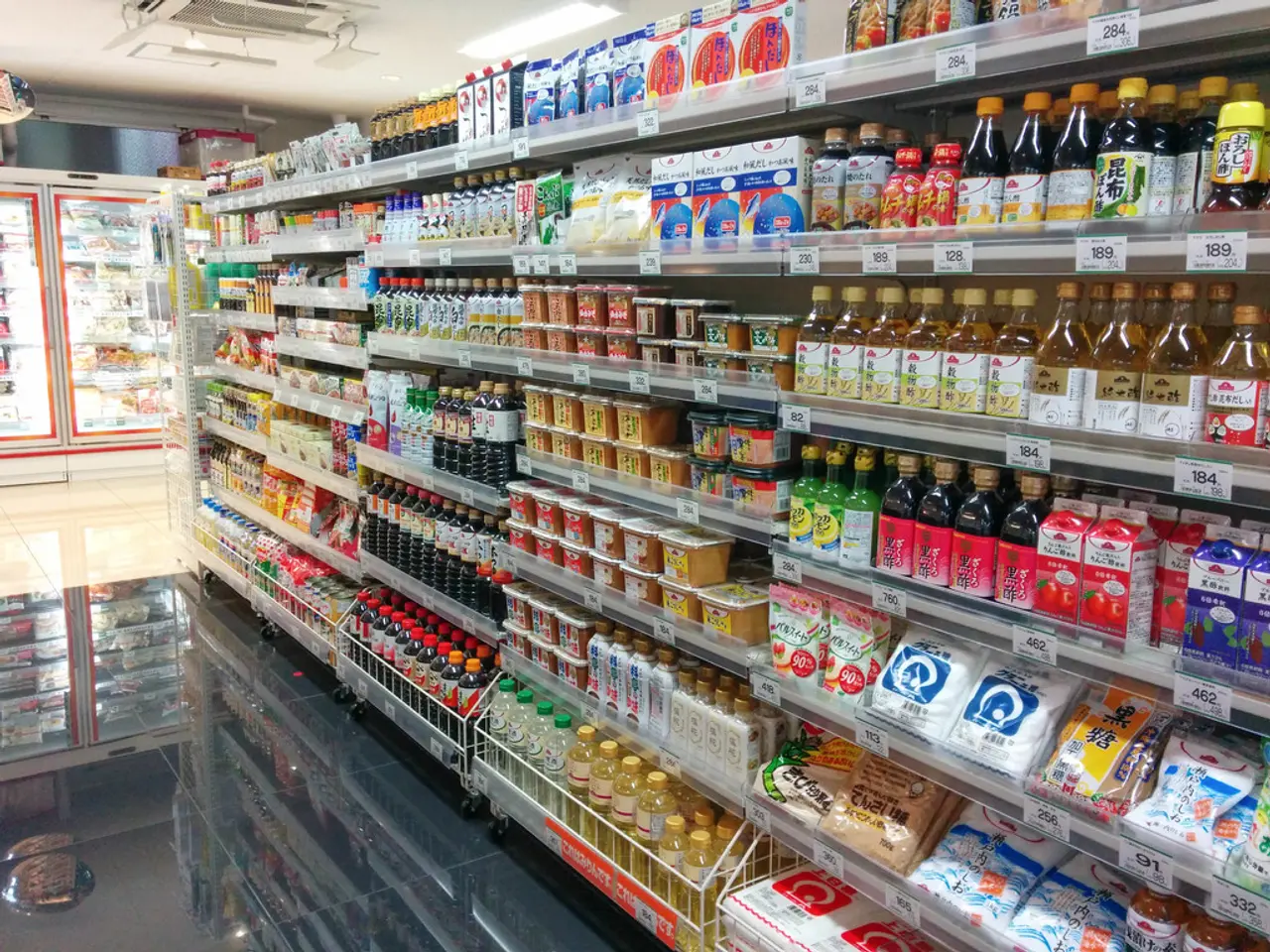Key takeaways
- Tariffs make it tough for small businesses to afford imports, especially those from China.
- To tackle rising costs, keep your business finances separate from personal, reassess income streams, and seek local community support.
Navigating Today: Strategies for Safeguarding Your Small Business from the Current Tariff Increases
Mallory Hank-Johnson, co-owner of Needle and Stitch Studio in Las Vegas, has been hit hard by tariffs. The $10 ribbon she orders has skyrocketed to anywhere from $60 to $80, along with other necessary supplies. This hurts her bottom line and gives her sleepless nights, worried about layoffs or raising prices too high for her military clientele.
Small businesses importing goods from countries like Canada, Mexico, and China are feeling the bite of tariffs, and it can be financially devastating, especially for those with slim margins. Raising prices might seem like the easiest option, but amid a rising cost of living, customers may balk at paying higher prices.
With tariffs pushing up prices, small business owners face unappealing options: swallow the higher costs, raise prices, switch to more expensive manufacturers, or shut down. Yet, raising prices may not be viable as customers can't afford it.
Amid market volatility, inflation concerns, and job uncertainty, financial decisions are consequential. Navigating Now series cuts through the noise, offering expert advice tailored to diverse financial situations, whether you're struggling to build savings amid rising costs, protecting retirement funds during market turmoil, or securing your income in an uncertain job landscape.
Related articles:
- Tackling Tariff-Driven Inflation: Strategies for Parents
- Saving for the Future When You Don't Earn Enough Today
The tariff impact and available options
Expert Stephen Kates, CFP, explains that tariffs drive up costs without a lot of options for owners relying on cheap overseas goods. You could switch suppliers, but most major U.S. importers have also experienced tariff hikes, meaning you might not find a cheaper alternative.
For many small businesses, the tariff uncertainty creates fear and makes it difficult to plan their business and their prices. Christopher Eaglin, an assistant professor at Duke University, calls this an uncomfortable situation that obliges owners to think creatively and dynamically about their business strategy.
Restaurants, bars and coffee shops
Tariffs today remind some business owners of the COVID-19 era when supply shortages and tariffs drove up prices. During the pandemic, businesses had access to the Paycheck Protection Program (PPP) loans, but no such relief is currently being offered.
Coping strategies for small business owners
Catering, cooking classes, hosting community events
Diversify income streams
Hank-Johnson introduced classes and community events for the first time to create new revenue streams. Consider other revenue options based on your business type, such as catering, cooking classes, or fleet management services.
Streamline business and look for efficiencies
Prioritize profitable lines of income and de-prioritize or discontinue less profitable ones. This may require investment in new equipment to increase efficiency and improve overall cash flow.
Retail brick-and-mortar
Learn and upskill
Take online courses to develop new skills like data storytelling, leadership, and marketing, among others. Platforms offering free courses for small business owners include Coursera, Small Business Administration (SBA), Google, EdX, Harvard University, and others.
Offering subscriptions, creating an online store, subleasing space, hosting classes and community events
Leverage federal and local resources
Contact your local SBA office to explore available programs for assistance. Check out national grants and programs tailored to different groups, such as women, veterans, low-income, or first-time business owners. Small Business Development Centers (SBDCs) also provide free training workshops and offer personalized assistance by applying.
Lean on local assistance
Consult universities or colleges for help, as they often partner with businesses, allowing students to gain real-world experience and contribute to local businesses. Mentorship with established businesses can also offer useful information on how to pivot and adapt in an uncertain environment.
E-commerce
Separate finances and protect personal income
Keep separate bank accounts and credit cards for your business to prevent legal, tax, and financial headaches. Set a regular salary for yourself, just like any other employee, and strive to keep a clear boundary between personal and business finances.
Partnering with other brands, offering digital products, offering subscriptions or memberships, attending trade shows or hosting your own events
Conclusion
Managing a small business amid tariffs is hard, but it's not impossible. By introducing new services, finding ways to make your business more efficient, upskilling, seeking local assistance, and separating your personal finances, you can mitigate some of the negative impacts of tariffs. For more guidance on creating a budget for your business, check out our website's comprehensive guide.
Expert insight
Christopher Eaglin, assistant professor, Duke University Fuqua School of Business
Small farms
Christopher Eaglin is an assistant professor in the Strategy Area at the Fuqua School of Business at Duke University. His area of expertise centers on understanding how entrepreneurs set strategies in uncertain environments, the governance of entrepreneurship environments, and more broadly how firm strategy-setting impacts building inclusive and sustainable economies.
Bill Fink, chief lending officer, Provident Bank; guest lecturer, University of Pennsylvania Wharton School
Starting a Community Supported Agriculture (CSA) program, hosting volunteers and events, renting out land
Bill Fink is Executive Vice President and Chief Lending Officer at Provident Bank, responsible for a $16 billion commercial portfolio managed by a 250-person team across NJ, NY, and PA. He served 20+ years at TD Bank, where he led U.S. Middle Market Banking, delivered record loan production, and steered major M&A reviews. A CPA and CGMA, Bill holds an MBA from Saint Joseph's University and advanced credentials from Wharton and Stanford. He serves on Wharton Executive Education's board and is a regular guest lecturer in its undergraduate Private Equity program.
Monika Hudson, professor, University of San Francisco; director, USF Gellert Family Business Center
Repairing and flipping cars, offering fleet management services
Dr. Monika Hudson is a full professor at the University of San Francisco and teaches entrepreneurship, family business, organizational behavior, and public administration on both the graduate and undergraduate levels. She directs USF's Gellert Family Business Center, promoting and supporting family firms in the Bay Area. She is also faculty lead for USF's undergraduate international business program. Dr. Hudson's research interests include entrepreneurship, identity and behavior, and the strategic implementation of the same within the private, public, and nonprofit sectors.
Stephen Kates, CFP, our website Financial Analyst
Auto and repair shops
Stephen Kates is a CFP® professional and personal finance expert specializing in financial planning and education. He serves as a Financial Analyst for our website, providing strategic insights on economic trends, wealth management, retirement planning, and personal finance. With over 15 years of experience in the financial industry, Stephen focuses on creating targeted consumer finance solutions for individuals, families, and business owners. He strategizes on simplifying complex topics and making financial planning accessible to everyone.
- Mallory Hank-Johnson, co-owner of Needle and Stitch Studio, has been hit hard by tariffs, leading her to diversify income streams by introducing classes and community events for the first time.
- Amidst the tariff uncertainties, small businesses need to streamline their operations, prioritize profitable lines of income, and seek local community support, like consulting universities or colleges for help.
- In navigating the impact of tariffs, small-business owners should separate their business finances and protect their personal income by keeping separate bank accounts and credit cards, and setting a regular salary for themselves.






